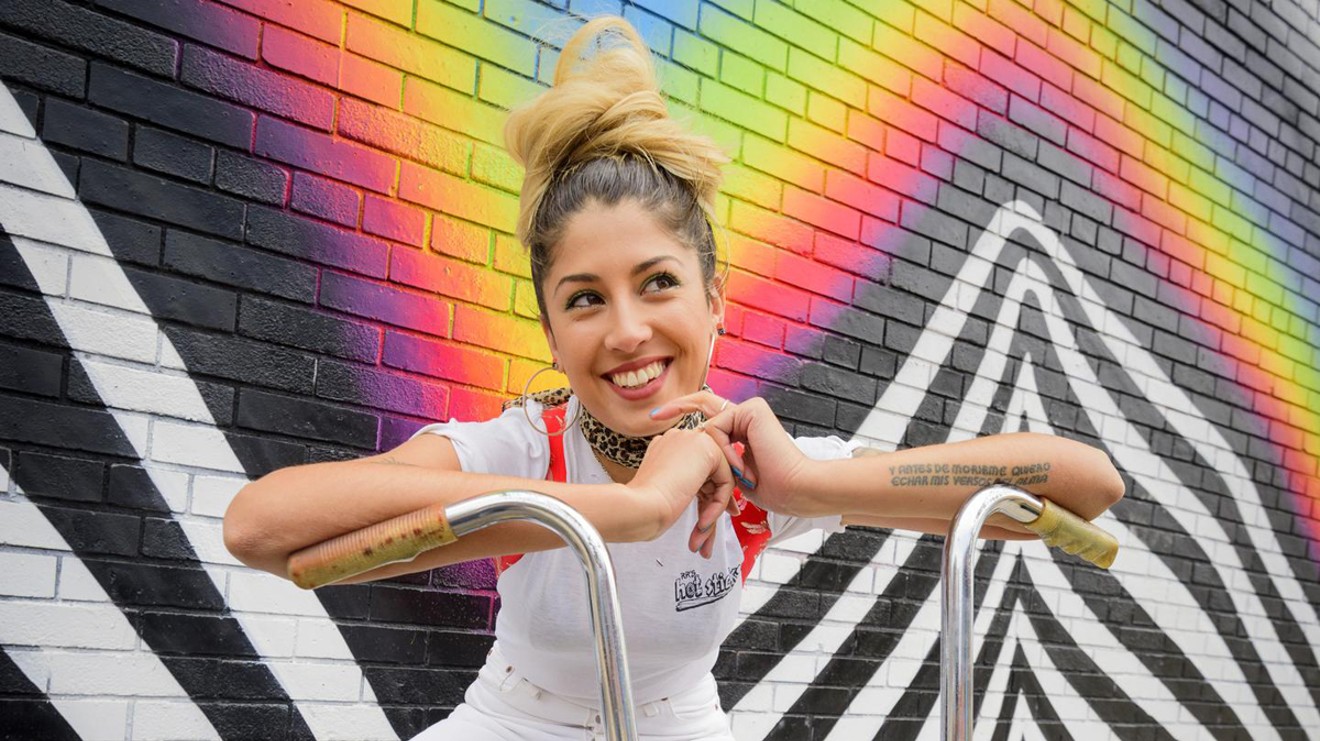“My dad’s first reaction was, ‘You’re a ruined woman! No man will marry you!’” she recalls with a laugh. “I was like, ‘Oh, my God, Dad.’ He’s so old-school.”
Hernandez’s father was wrong. She wed last year, and the fact that her husband is covered in tattoos hasn’t kept her parents from adoring him.
“My parents absolutely love him,” she says. “I feel like me and my brother have broken them down, but ten years ago it was a different story.”
By Hernandez’s account, growing up in a Cuban-American family in Detroit with her younger brother wasn’t without its moments. Her parents owned a Mexican restaurant and bakery. She grew up listening to her father’s Iggy Pop and Alice Cooper records. (Her mother, an ’80s girl to the end, preferred New Order and the Clash.)
Hernandez sang in a choir growing up and eventually found her way into the local underground music scene. Despite her parents’ constant encouragement, she spent years thinking music was a hobby and nothing more.
“My parents were always like, ‘You have a beautiful voice. You need to take it seriously,’” she says. “My response every time was, ‘You have to tell me I’m a good singer. You’re my parents.’”
Thinking music would never work out, she went to fashion-design school at Columbia College, but soon decided to drop out. When she told her parents she was going to quit and pursue music full-time instead, their response was less than conventional: They were thrilled.
Hernandez had already gained experience singing on various projects by music-production students at Columbia, but she decided to hone her chops on the coffee-shop and open-mic circuits. Painfully shy from the start, she stuck to playing folksy guitar tunes inspired by Regina Spektor, Joanna Newsom and Conor Oberst.
It was that shyness that made her start playing with the Deltas.
“My thinking was, if I have all these players, then nobody is going to pay attention to me,” she says. “It was a way for me to deflect from myself. After that, it was like, ‘Oh, this is what I want. I want a band.’”
She recruited her musical friends and gave the group the temporary name of the Deltas, after the 1967 Delta 88, one of her favorite cars. By the time she remembered the name was only meant as a placeholder, she decided it wasn’t worth going to the trouble to change it.
Now the Deltas are a full, bona fide band, bonded by what Hernandez describes as a “siblingship.” It has its positives — thrifting is now a band-wide activity — and its negatives: For instance, Hernandez, who refers to the other members as “the guys,” would rather they didn’t trim their toenails in the van. (She does praise the group for keeping partying to a minimum, though, confessing that bowling and trips to the gym are favorite ways to kill time on the road.)
On the Deltas’ sophomore album, Telephone/Telefono, the full band’s presence is especially felt. Whereas Hernandez wrote the entirety of her debut studio album, 2014’s Secret Evil, by herself, she wrote a significant chunk of Telephone together with her bandmates while holed up in a cabin in northern Michigan. The record bursts with zippy, soulful pop rock that draws on dynamic Latin influences, ’80s synth-pop and a bit of blues flair for its power.
Telephone/Telefono is actually two albums: There’s an English and a Spanish version, the latter of which Hernandez re-recorded with friends in Mexico City, an endeavor that proved frustrating at times.
“We spent a lot of time, when we were working on the lyrics, with enunciation, making sure my accent was good, making sure I was saying all the words properly,” she says. “I had a few moments where I felt defeated and was like, ‘What the fuck did I get myself into?’”
Collectively, the two albums speak to representation, visibility and inclusion. As a woman of color, Hernandez knows she’s not the typical rock songwriter. And now she’s making an attempt to shift that paradigm.
“I craved looking up to someone who looked like me and had a similar background to me for inspiration and motivation. I want to be able to give that to younger girls,” she says. “Especially within rock, you don’t see that many Latin women. It’s giving myself the gift I never got when I was a kid.”
Although the album was written prior to Trump’s election (and, on a personal note, just before her wedding), Hernandez is the first to acknowledge how the Trump administration has politicized it in ways she didn’t anticipate. Now she hopes it may help change a few Trump supporters’ minds.
Says Hernandez: “If I can get someone who listens to Donald Trump to subconsciously realize this Hispanic woman is talented and they love her music and want to support her — to me, that’s more of a milestone.”
Jessica Hernandez & the Deltas, Friday, June 2, Lost Lake Lounge, 303-291-1007.











